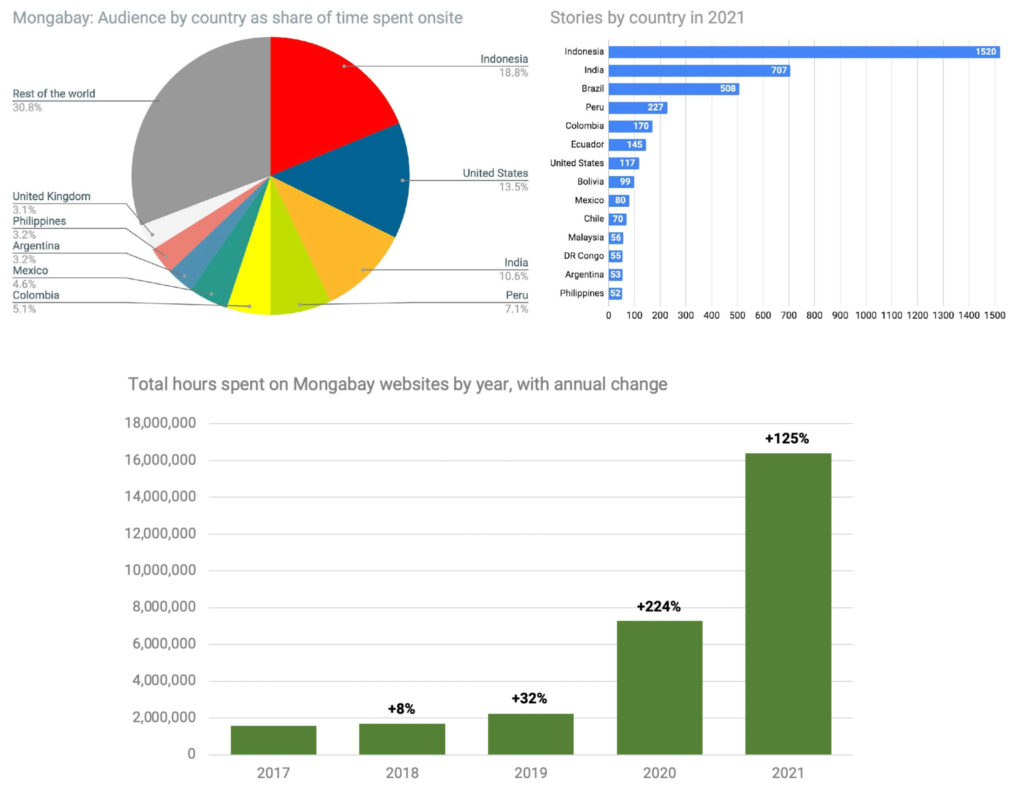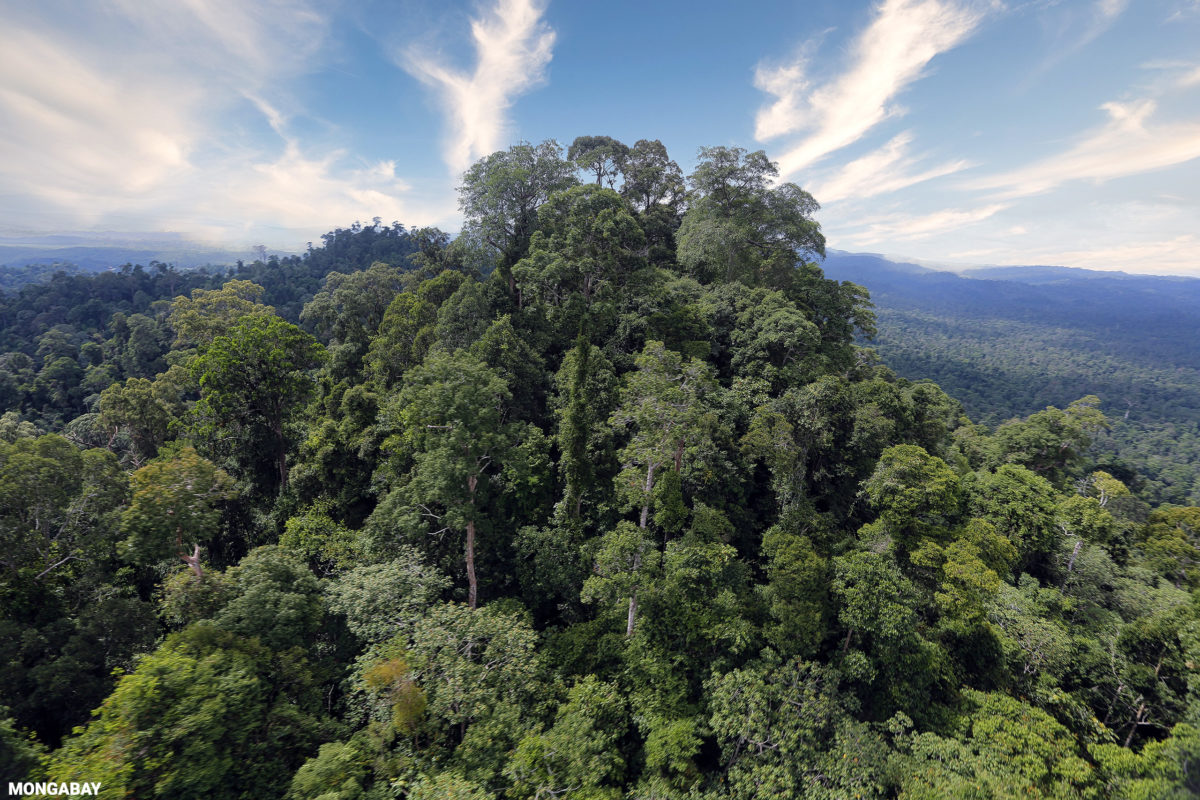Mongabay persevered through the many challenges of 2021, continuing to publish high quality journalism and expand our impact. We ended the year stronger than we began it.
Key numbers
In 2021 we published nearly 5,000 stories in six languages covering more than 110 countries. This reporting attracted 54 million users to our website, including visitors from every country on Earth. Collectively, these visitors spent 16.4 million hours in 2021, 121% more time than in 2020.

Expansion
Mongabay’s global team grew 22% to 67 staff in 20 countries. Much of this expansion occurred at Mongabay India, which launched a Hindi team in late November 2020.
We hired our first dedicated French editor to expand coverage and impact in French-speaking West and Central Africa. Adding this French capacity will enable Mongabay to build a network of French-speaking journalists who we weren’t previously able to engage, and lays the groundwork for new media partnerships as well as a larger audience in the E.U.
Mongabay also created a dedicated team focused on issues at the intersection of nature, Indigenous peoples and local communities.
Telling our story
Mongabay’s 2021 expansion included hiring our first marketing staff to help us better tell the story of our work and impact.
This new capacity is part of a shift in the organization’s marketing strategy to prioritize high engagement audiences over the general interest mass market. We believe this shift has greater opportunity for impact by reaching more key decision makers and people who influence policy.
In practical terms, this shift meant that Mongabay deprioritized Facebook relative to other platforms and approaches. While Facebook is Mongabay’s largest source of traffic, the ongoing toxicity of the platform and deteriorating quality of its audience were key factors in this decision.
As a result of the strategy shift, as well as the broader decline in news consumption across the Internet in 2021, Mongabay experienced a decline in total traffic, but a sharp rise in the quality of engagement as evidenced by a 197% rise in the average time that readers spent per visit. And as noted above, total time spent on Mongabay sites rose in 2021 despite the drop in top-line traffic.
New offerings
In 2021 we continued to expand our multimedia, including new podcasts, new short-form video series, and data visualizations. We produced more than 500 videos and hundreds of maps, graphics, and other visualizations that have been used on Mongabay and beyond.
We launched and further developed multiple decision-support tools, including:
- Reforestation.app a tree planting transparency tool that aggregates information on hundreds of reforestation projects worldwide.
- Mongabay Latam’s database on the legal status of Indigenous territories in Peru, which found that 647 native communities in the region do not have any official recognition that certifies their existence, and at least 1,247 Indigenous communities have been affected by some type of illegality, including logging, mining, and coca cultivation.
- Mongabay Latam’s search tool that brings together more than 50 successful marine conservation strategies in 12 Latin American countries
- Mongabay worked with InfoAmazonia and the Pulitzer Center to develop a Twitter bot to track and share information about new permit requests filed with Brazil’s National Mining Agency that overlap with Indigenous and protected areas in the Amazon.
On the education front, we launched a new version of our environmental education site for kids. Mongabay Kids aims to inspire and inform young people on ecology, wildlife, and conservation.
Investigations
Across our bureaus, Mongabay produced dozens of investigations in 2021. These ranged from an exposé on abusive labor practices by a Chinese fishing company against Indonesian workers to an investigation on the poisoning of an Indigenous community by Brazil’s palm oil industry.
- We published an extensive series that looked into the “nature-based solutions” space, including bioenergy, coastal climate solutions, agroecology, agroforestry, soil carbon, carbon offset markets, reforestation, and rangeland restoration.
- We continued our long-running examination of commodity supply chains, ranging from palm oil to soybean production.
- We undertook a number of investigations into how resource demand is affecting Indigenous peoples and local communities.
Our investigative reporting won a number of accolades, including shortlisting for a 2022 Fetisov Journalism Award, the Kalpataru Award for environmental protection for reporting in India, recognition from the Society of Environmental Journalists’ Annual Awards, the Oktovianus Pogau Award for Courage in Journalism, the SEAL Environmental Journalism Award, and the 2021 Wild and Scenic Film Festival Spirit of Activism Award for the film “Our Mothers’ Land,” among others.
For several of these investigations, we partnered with other media outlets to maximize the scope, reach, and impact of the reporting.
New partnerships
Beyond joint investigations with other media outlets like Al Jeezera and the BBC, Mongabay formed or strengthened several partnerships in 2021.
We built on our long-running relationship with Global Forest Watch by adding new data visualization capacity and integrating new data sources, including near real-time radar data from the European Space Agency’s Sentinel-1 satellites, which can detect deforestation otherwise obscured by cloud cover or smoke.
We formally unveiled a partnership with NowThis, the world’s most-watched mobile news provider, to bring environmental news to young audiences via NowThis Earth.
We also are now a story provider for EarthHQ, an environmental data dashboard that was launched by the Global Commons Alliance in November 2021.
Mongabay India established a collaboration with the Technology for Wildlife Foundation, while Mongabay Indonesia launched partnerships with several Indonesian universities to build journalistic capacity to report on environmental issues and collaborate on data analysis.
Mongabay produced eight videos for the Nature+Newsroom which were broadcast during the COP26 climate treaty negotiations in Glasgow.
Organizational development
Mongabay added three new board members during 2021:
- wildlife disease ecologist and journalist Debby Ng from the National University of Singapore and the Himalayan Mutt Project,
- forest rights and resources expert Steve Rhee, a former Ford Foundation program officer,
- and accountant and financial management expert, Michael Dye.
We emerged victorious in a lawsuit which attempted to stifle Mongabay Latam’s coverage of environmental crimes by a plantation company in Peru. The decision established an important legal precedent that strengthens protections for environmental journalism in Peru.
Selected impacts
Mongabay’s reporting continued to drive real-world impacts. A few examples:
- An Australian mining company lost more than a third of its value—$150 million—on the day it disclosed it was the subject of “a pending media report questioning the legality” of its prospective mining operation in Guinea. That media report was a Mongabay’s investigation which revealed that some of the project is located within the buffer zone of the Upper Niger National Park. A couple days later, an executive of the mining company was grilled on BBC about our report.
- Sabah officials sent to COP26 postponed a plan to try to sell carbon offsets to big polluters after Mongabay broke news about a secret carbon deal in Malaysian Borneo. The exclusive story was re-reported widely around Malaysia. Near the end of 2021, a local Indigenous leader decided to sue the government for signing away the rights to monetize the natural capital coming from the state’s forests to a foreign company. This represents a significant development and potential reversal of a scheme that could’ve had a long-term negative impact on Indigenous people and local communities.
- Officials with the Word Wildlife Fund for Nature (WWF) informed Mongabay that they reached a crowdfunding target following publication of the article “Pingers on fishing nets found to save river dolphins in Indonesian Borneo.” As a result, they will be able to equip all fishers operating in the dolphins’ range in the Mahakam River with acoustic pingers.
- Mongabay’s series on exploitative tuna fisheries in Seychelles spawned inquiries into the shady practices that allow companies to get away with paying no taxes.
- Mongabay Indonesia’s reporting on floods in West Kalimantan were presented to the President of Indonesia. Mongabay’s reporting linked the floods to deforestation for oil palm.
- Following publication of a Mongabay Indonesia story, the government of Sorong in West Papua stopped a reclamation project in Mangga Dua due to potential damage to mangroves.
- Mongabay Indonesia’s reporting was regularly used by that country’s Ministry of Maritime Affairs and Fisheries to inform decision-making around marine policy, and by the Ministry of Forestry and Environment on issues related to social forestry.
- Mongabay India’s Sahana Ghosh was one of the 100 global fellows selected in the first cohort of the Oxford Climate Journalism Network and one of the Global Landscape Forum’s 16 global women restoring the earth.
- After sharing our agroforestry series with Microsoft leadership, the tech giant decided to include agroforestry in their request for proposals for carbon investments. In 2021, the company announced a first round of investments, which include two agroforestry projects in Peru, Brazil, and Colombia.
- Mongabay’s investigative reporting on industrial fishing activities off Madagascar garnered attention within the national government, mainstream Malagasy press, and the U.S. Embassy in Madagascar and Comoros. Madagascar’s fisheries chief subsequently launched an investigation into illegal fishing.
- Reporting by Mongabay India on the Indian government’s plan to start mining for uranium in a tiger reserve triggered a series of stories by local media. The outcry prompted the atomic minerals department to cancel the project.
- After being featured by Mongabay India’s Wetland Champions series, conservationist Bijay Kabi was recognized by the Indian Prime Minister in a radio address.
- Mongabay Latam’s mini-series on shark bycatch in Ecuador, Peru, and Chile prompted the Chilean government’s Undersecretariat of Fisheries and Aquaculture to order the mandatory return of rays and sharks accidentally caught during fishing operations.
- Mongabay India’s coverage of how mining dried the water bodies in a village in Goa had immediate and effective impact with the Goa state public works department launching a pipeline scheme for the village.
- Federal prosecutors cited the Mongabay investigation into the Brazilian palm oil supply chain to move forward with a process to hold companies accountable for water contamination and other socio-environmental damages suffered by Indigenous peoples and traditional communities.
We are deeply appreciative of the donors who’ve supported our work in 2021. We have a lot to be excited about in the coming year, and look forward to continuing to inform decisions and inspire actions with trustworthy news and information from Nature’s frontline.

